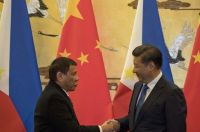
One of the most dramatic instances of a declining US influence has been the Philippines under its current president Rodrigo Duterte.
In return for this abrupt reversal of long-standing Philippines policy regarding the South China Sea, Beijing is believed to have offered Manila trade deals worth $13 billion. Photo by Getty Images.
One of the hallmarks of US foreign policy under President Obama has been the attempt to reorient the direction of the State Department towards a rising Asia and away from the Middle East, where the Bush administration had invaded Iraq and Afghanistan. Despite the self-evident economic importance of Asia, and the rising challenge of China as a power second only to the United States, the task has not been easy. Try as the president has, extricating the US forces from Iraq and Afghanistan has proven difficult. The current assault on the ISIS-controlled Iraqi city of Mosul would be impossible without substantial US support including US Air Force attacks and substantial special forces involvement. There remain over 4,000 US forces in Iraq and a larger number, some 8,500, in Afghanistan. Within the Asian region as a whole President Obama’s rebalancing towards Asia has been seen as half-hearted.
One of the most dramatic instances of a declining US influence has been the Philippines under its current president Rodrigo Duterte. Despite long standing ties – the Philippines were governed by the United States from 1898 to the Second World War – relations between Washington and Manila are at an all-time low. This was underlined in a recent visit to Beijing by the Philippines president who announced, to the delight of his Chinese hosts, his ‘separation’ from the United States. To add salt to the wounds President Duterte said he was willing to overlook the ruling of the Permanent Court of Arbitration in The Hague in July of this year rejecting China’s sweeping claims to the South China Sea and the absence of any legal basis to Beijing’s claims. In return for this abrupt reversal of long-standing Philippines policy regarding the South China Sea, Beijing is believed to have offered Manila trade deals worth $13 billion.
This said, the Philippines has not so far cancelled the joint military exercise with the US that form a key part of the US military presence in the region. Moreover countless thousands of Filipinos have long-standing ties with the US through relatives living there.
In isolation the crisis in relations between Manila and Washington, exacerbated as they are by the licence President Duterte has given his security forces to carry out hundreds of extra judicial killings of alleged drug dealers in recent months, could be contained. However, the fact that President Duterte has now sought to rebalance the Philippines long-standing commitment to the United States by an overt courting of China risks, notwithstanding long-standing differences over the South China Sea, placing US relations with the Philippines under considerable pressure.
To underline Washington’s concerns, US Assistant Secretary of State for Asia Daniel Russel is visiting Manila this week seeking clarification of President Duterte’s remarks in Beijing that the separation from Washington was not only military but economic as well.
Developments in the Philippines on the cusp of US presidential elections have fuelled concerns that Beijing is deepening its inroads into ASEAN. Already, Cambodia, one of its poorest members, is in receipt of very considerable Chinese funding. As if to underline the point in June, Cambodia forced ASEAN to retract a strongly worded statement on the South China Sea and within days was in receipt of a new $600 million loan from Beijing. China’s grip on one of ASEAN’s poorest members has enabled it to thwart and undermine US influence over the wider ASEAN grouping.
Serious though these developments are they pale to the almost certain likelihood that the Trans-Pacific Partnership (TPP) will fail to achieve ratification in Washington before President Obama leaves office. Chances of the 12-nation Pacific Rim trade pact meeting US congressional approval are now slim. Singapore’s Prime Minister Lee Hsien Loong has described the TPP deal as ‘a litmus test’ for US credibility in the region. Over the past weekend Deputy Prime Minister Tharman Shanmugaratnam warned of a failure of nerve in Washington and a ‘major setback for the standing of the US in Asia’.
There is still the outside chance that President Obama’s administration could try and push the TPP deal through Congress after the November election and the inauguration of the new president in late January. Most observers see this, however, as a long shot. Without it, history is unlikely to be kind to President Obama’s pivot to Asia.




